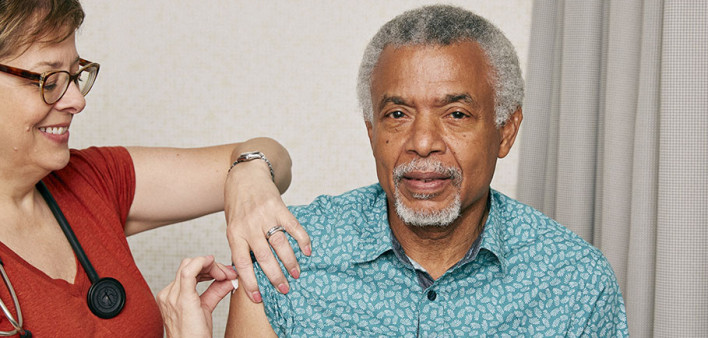On December 1, the Food and Drug Administration approved PreHevbrio, the first vaccine that targets three different hepatitis B virus (HBV) proteins. In clinical trials, PreHevbrio offered more protection than the single-target Engerix-B vaccine, especially for older adults and people with weaker immune systems, and did so faster. The new vaccine is approved for adults with any known subtype of the HBV.
Vaccination has led to a dramatic drop in new hepatitis B cases worldwide—a decrease that will ultimately result in declines in cirrhosis, liver cancer and the need for liver transplants. Universal immunization for infants was implemented in the United States in 1991, and the Centers for Disease Control and Prevention’s Advisory Committee on Immunization Practices (ACIP) recently expanded its adult vaccine recommendation to include all individuals up to age 60, irrespective of risk factors.
However, some adults who receive a complete three-dose series of widely used HBV vaccines do not achieve full protection, meaning they don’t produce high enough levels of antibodies against the virus. This is more likely among people with poorer immune function, including older individuals and those with comorbidities.
Existing HBV vaccines—Engerix-B, Recombivax HB, Heplisav-B and the dual hepatitis A and B vaccine Twinrix—are monovalent, or single-target, vaccines that contain a genetically engineered version of the hepatitis B surface antigen small S protein. PreHevbrio (formerly known as Sci-B-Vac), from VBI Vaccines, is a trivalent, or triple-target, vaccine that contains the S protein plus two larger viral surface proteins, pre-S1 and pre-S2.
Results from the Phase III PROTECT trial, previously reported at the 2019 IDWeek meeting and published in The Lancet Infectious Diseases, showed that participants assigned to receive three doses of PreHevbrio—one at the start of the study, another 28 days later and a third about six months later—were more likely to produce adequate antibody levels than those who received three doses of Engerix-B.
Among all adults, 91% of PreHevbrio recipients and 77% of Engerix-B recipients achieved adequate immune protection four weeks after the last dose, and the protection rate remained higher in the PreHevbrio group after nearly a year of follow-up (89% versus 69%, respectively). Among participants ages 45 and older, protection rates were 89% versus 73% a month after the final dose. Higher response rates with PreHevbrio were also seen in people with obesity (89% versus 68%) and those with diabetes (83% versus 58%).
Results from the Phase III CONSTANT trial, recently published in JAMA Network Open, showed that three doses of PreHevbrio resulted in higher hepatitis B surface antibody concentrations and higher rates of seroprotection (adequate antibody levels) than Engerix-B in healthy adults ages 18 to 45.
After three doses, average antibody levels were 3.5 times higher with PreHevbrio compared with Engerix-B, and seroprotection rates were 99% versus 95%, respectively. What’s more, the difference was more pronounced after two doses: The mean antibody concentration was nearly eightfold higher with PreHevbrio, and seroprotection rates were 90% versus 52%, respectively.
“The rapid induction of protective antibody levels in more than 90% of participants after two doses of [PreHevbrio] in the current study is noteworthy, particularly for populations in whom rapid seroprotection is required,” wrote study authors Timo Vesikari, MD, of the Nordic Research Network, and colleagues.
PreHevbrio was generally safe and well tolerated, but rates of local reactions (85% versus 66%) and systemic reactions (68% versus 60%) were higher compared with Engerix-B. However, serious adverse events were infrequent (2% versus 0.4%) and few people did discontinued the vaccine series due to side effects. The most common local reactions are injection site pain and tenderness while the most common systemic side effects are fatigue, muscle aches and headache, which usually resolve within two days.
“As we work to implement the ACIP’s new universal hepatitis B vaccine recommendation for all adults ages 19 to 59, as voted on in November, we benefit from having more tools, including this newly approved three-antigen hepatitis B vaccine,” Chari Cohen, DrPH, MPH, senior vice president of the Hepatitis B Foundation said in a VBI press release. “Having more vaccine options will help us effectively expand vaccine uptake, ensure more people are protected from hepatitis B infection and reach the 2030 goal of eliminating hepatitis B in the U.S.”
Click here to read the JAMA Network Open abstract.
Click here for full prescribing information for PreHevbrio.
Click here for more news about hepatitis B.







1 Comment
1 Comment